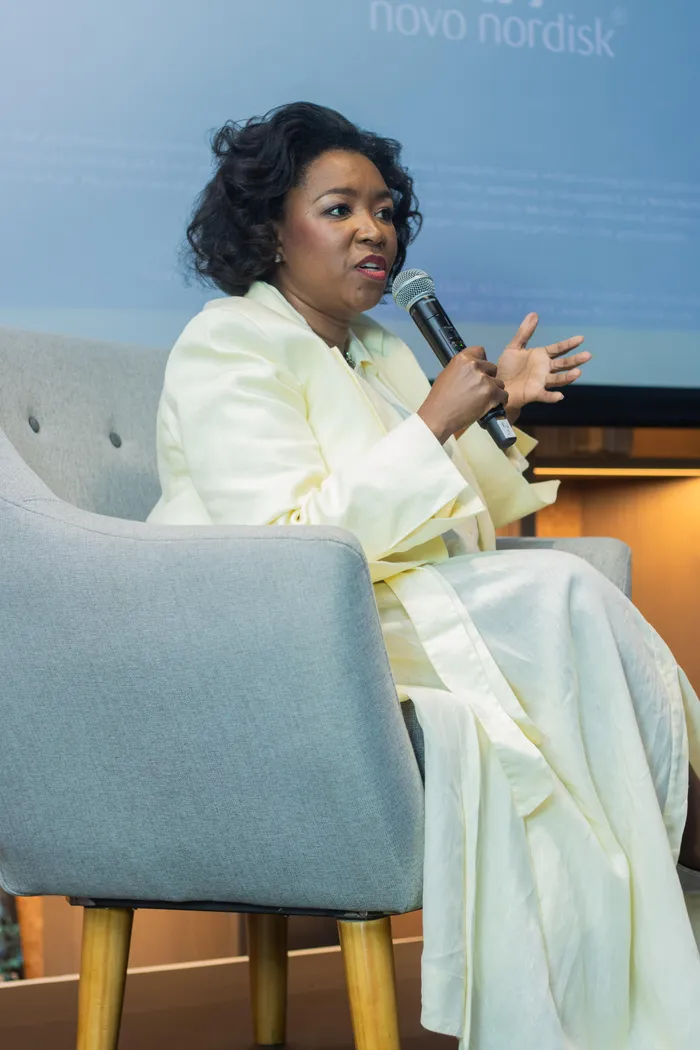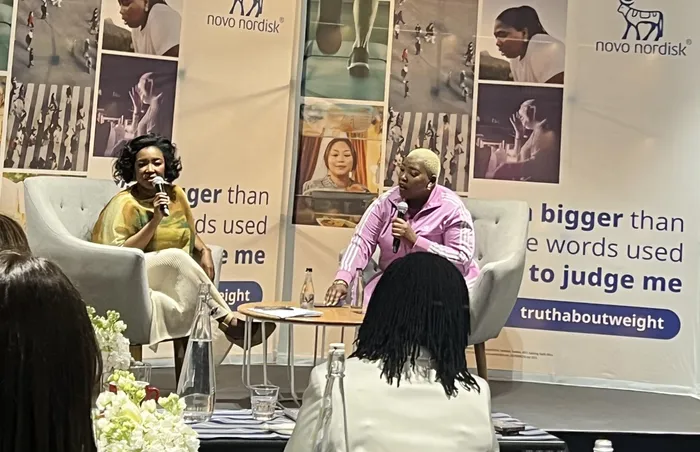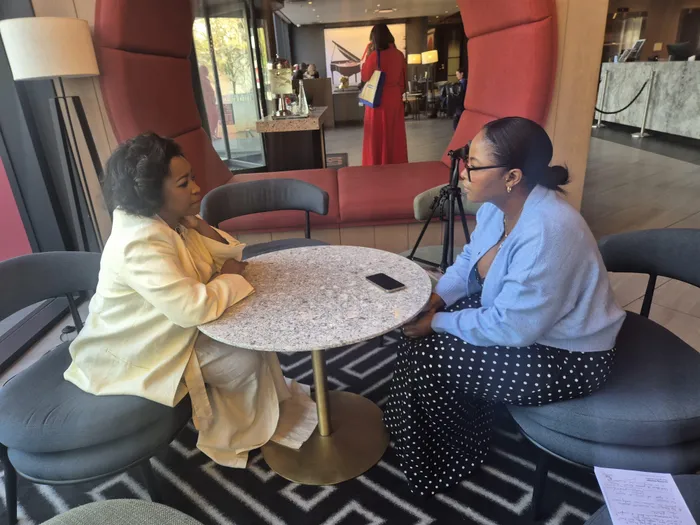Body image, Women's Month and the power of choice: Phemelo Motene speaks out

South African Broadcaster Phemelo Motene at the Novo Nordisk launch in Johannesburg
Image: Supplied
When I sat down for my interview with Phemelo Motene, my nerves initially got the better of me. However, despite some wobbles while steadying the camera on my tripod to record, her calming disposition helped everything fall into place.
She greeted me with the serenity that smooths chaos: patient, warm and unhurried. In that instant, I knew this conversation would stretch beyond an interview.
After all, this is a woman who has lived enough to tell the truth and is kind enough to share it.

During a recent discussion with fellow broadcaster and comedian Celest Ntuli, centered around Novo Nordisk's launch of Wegovy®
Image: vuyile madwantsi
For Motene, the takeaway is simple: “Be kinder. Keep your opinions to yourself if they don’t help. Mind your own business.”
“We often don’t know someone’s story. Maybe they’re on medication. Maybe all they’re grateful for is being alive. Your opinion about their body might be cruel, even if you think it’s harmless.”
In a country where body shaming persists, her emphasis on compassion serves as both guidance and a clear boundary.
“You know that aunt who hasn’t seen you in years, and the first thing that comes to mind is, Yho awutyebe! (You are so big now!) Also, that's just me being politically correct, because it's usually harsher than that.
For Motene, conversations about weight often begin with age. “You start noticing things ‘creaking’ health forces you to pay attention,” she said in conversation. This often becomes a deeper reflection on why so much of women’s identity has been tied to body size.
But she sees progress. “Young people today are owning their bodies more,” she said.
“When I was younger, the focus was on being thin at all costs. Now I see healthier conversations, more acceptance. Fashion houses are showing different body types, and retailers are catering to all shapes. That’s worth celebrating.”
The backdrop to this, however, is sobering. The WHO reports that global obesity has nearly tripled since 1975, with over 1 billion people now living with obesity. In South Africa, the burden is heavier on women; about 43% live with obesity compared to 18% of men.
These aren’t just appearance statistics; they’re linked to heart disease, diabetes, and other chronic illnesses.
Ahead of our tête-à-tête, Motene hosted the launch of Novo Nordisk's Wegovy, the country's first once-weekly GLP-1 therapy approved for treating obesity and overweight, featuring the talented queen of Zulu comedy, Celest Ntuli.
And the connection between food and weight gain emerged as a key topic. They acknowledged that food serves as a source of comfort, a sentiment shared by many South Africans.
However, the relationship with food can also be complex when it comes to weight. While the enjoyment of food is widespread, it can sometimes contribute to weight gain.
A such, it is important to understand that weight gain is influenced by various factors, not just diet. Scientific research shows that elements such as obesogenic environments, psychological influences and genetic predispositions all play a role in the obesity epidemic.
Our conversation then turned to Women’s Month itself. Motene didn’t mince words. Every August, South Africa turns its attention to women's rallies, panels and corporate luncheons. She attends and sometimes leads these events, but she isn’t convinced they change what needs changing.
She asked the question many of us think: Who benefits when we reduce meaningful struggle to a calendar page?
“If you are being beaten at home or discriminated against at work, does August stop that? No,” she said. “Events are good for conversation, but I’m not sure they translate into safety or security for ordinary women.”
“I’m not against the events, but we must ask, so what? Are we making women safer? Are we changing their daily lives?”

As Women’s Month unfolds, Motene offers a critical perspective on its significance.
Image: vuyile madwantsi
Her challenge is for all of us, organisers, attendees and journalists, to bridge the gap between commemoration and transformation.
Perhaps Motene’s strongest theme is authenticity not as a hashtag, but as a daily choice.
“The less we benchmark ourselves against others, the better,” she said in conversation. “If you choose you and honour your path, even when it’s difficult, it will reward you in ways money or status can’t.”
She warns against staying in a job, relationship, or lifestyle because it “looks good” to others. “People may call you ‘goals’, but if you’re not happy, it won’t end well; sometimes it ends tragically.”
Her advice is deceptively simple: stop living for other people’s perceptions. Honour the life you’re actually living behind closed doors.
Motene’s career has been built on hosting big conversations, from facilitating the Nelson Mandela Lecture to moderating WHO panels. But sitting across from her, I realised her real craft is holding space for complexity.
She can deliver critique without stripping away compassion. She can sit in discomfort without rushing to fix it.
As we were about to wrap up the interview, my tripod once again tested my patience, but she responded with a warm smile. I silently celebrated, "Yay, girl power!"
But one thing lingered about Women's Month, a reminder not just to celebrate women, but to see them whole and unfiltered. To listen, to learn, and to do the work that brings real change.
Motene is one of South Africa’s most respected broadcasters, currently hosting Point of View on Kaya 959, where she dissects the day’s headlines, fields audience questions and makes space for expert insight.
Her career spans major media houses, including Primedia, the SABC, and MultiChoice, as well as prestigious facilitation work for organisations such as the Nelson Mandela Foundation and the World Health Organisation (WHO) in Geneva.
Icons like Dr John Kani and Prof Zakes Mda have praised her interviewing craft.
Despite her numerous titles and accolades, she speaks most compellingly about aspects not found on her CV: identity, health, authenticity, and the true meaning of Women's Month beyond speeches.
“The spotlight isn’t my problem.”
I asked if she still worries about the attention that comes with her platform. She shook her head.
“Long ago, I decided I’m not living my life worrying about being in the spotlight,” she said. “I don’t see myself as a role model people must look up to. I just do the work. What I do is not connected to how I look. My health is my life, the spotlight isn’t my problem.”
It was the first of many moments where her answers carried both freedom and defiance, the kind that comes from doing the work and letting go of other people’s expectations.